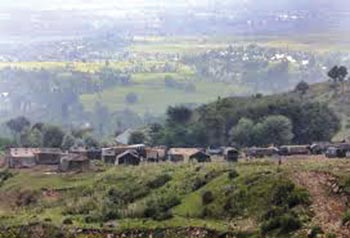SRINAGAR: Coinciding with the 73rd anniversary of the signing of the instrument of accession, the Government of India issued new land laws for Jammu and Kashmir on October 26, 2020, 14 months after its special status was undone and the state was bifurcated into two Union territories. The new laws opened the sale of the land in Jammu and Kashmir to outsiders as it omitted the clause of “permanent residents”, a pre-requisite to the land purchase, from the relevant laws.

Under the Jammu and Kashmir Development Act, the government can designate an area as “strategic” on the recommendations of the army.
Section 3 of the Under the Jammu and Kashmir Development Act reads: “After sub-section (2), insert -(3) Notwithstanding anything contained in this Act, the Government may on the written request of an Army officer not below the rank of Corp Commander, declare an area as Strategic Area within a local area, only for direct operational and training requirements of armed forces, which may be excluded from the operation of this Act and rules/regulations made thereunder in the manner and to the extent specified in the declaration and the Government may satisfy itself about the reasons cited for declaring the area as strategic area and will have such area notified accordingly with such conditions as may be required.”
People as well as investors outside Jammu and Kashmir can now purchase land in the Union Territory (UT) as the Centre on October 27 notified new land laws for the region, ending the exclusive rights of locals over the land granted under now abrogated Article 370.
In the same piece of law, piloted by the MHA, the term “being permanent resident of the State” as a criteria has been “omitted”, paving the way for investors outside J&K to invest in the UT.
Under the ‘transfer of land for the purpose of promotion of healthcare or education’, the government may now allow transfer of land “in favour of a person or an institution for the purpose of promotion of healthcare or senior secondary or higher or specialized education in J&K”.
Under the same act, the MHA set up Jammu and Kashmir Industrial Development Corporation (J&K IDC) for “securing and assisting in the rapid and orderly establishment, and organization of industries in industrial areas and industrial estates in the Union Territory of Jammu and Kashmir and for the purpose of establishing commercial centers in connection with the establishment and organization of such industries”. The powerful corporation with enormous powers can acquire and hold “property, both movable and immovable” and will “lease, sell, exchange or otherwise transfer any property held by it”; provided amenities and common facilities in industrial estates, commercial centers and industrial areas; can make available buildings on hire or sale to industrialists or persons intending to start industrial undertakings or commercial establishments or both; can construct buildings for the housing of the employees of such industries or commercial establishments; allot factory sheds or such buildings or parts of buildings, including residential tenements to suitable persons in the industrial estates established or the industrial areas developed by the Corporation; allot shops and other buildings to suitable persons in commercial centers established by the Corporation; and can modify or rescind such allotments, including the right and power to evict the allottees concerned on breach of any of the terms or conditions of their allotment.
While the Peoples’ Alliance on Gupkar Declaration (PAGD) decried the amendments and changes in the land laws and asserted they will fight it out, the BJP welcomed the move. “The amendments in the land laws will mark the beginning of a new era of development in the Union Territory with new avenues waiting for the residents to become part of this new journey of progress and prosperity which Prime Minister Narendra Modi has promised to one and all,” former deputy chief minister Kavinder Gupta was quoted saying. “The changes (in laws) will open the floodgates of development in Jammu and Kashmir, something the region had been denied in the past over 70 years due to myopic and discriminatory policies of the Congress and other regional mainstream parties which ruled the erstwhile state at different points of time.”















